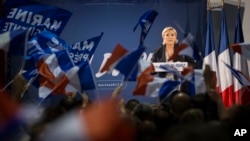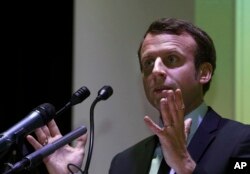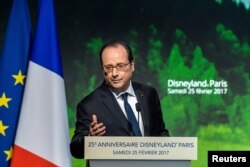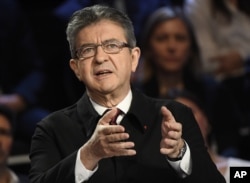Polls showed France's presidential election campaign tightening further on Wednesday as financial markets fretted about the rising popularity of a far-left candidate who wants to put France's European Union membership to a vote.
Investors have long been anxious about election frontrunner Marine Le Pen, leader of the far-right National Front, who has promised a referendum on whether to quit the EU and ditch the euro.
She has been joined on the list of investors' concerns by far-left veteran Jean-Luc Melenchon, who has surged in the polls after strong performances in two candidates' debates.
The Communist-backed Melenchon also wants a referendum on EU membership after an attempt to renegotiate the EU treaties.
Fillon stable in poll
The latest Ifop-Fiducial poll on Wednesday showed Le Pen winning 23.5 percent in the April 23 first round, one point ahead of centrist Emmanuel Macron.
Both Le Pen and Macron's support dipped by half a point from Tuesday while conservative Francois Fillon was stable on 19 percent and Melenchon unchanged on 18.5 percent.
The top two candidates go through to a run-off on May 7, where polls say Macron would easily beat Le Pen.
Traders cited the French election, as well as U.S. relations with Syria and North Korea, as reasons why investors switched to safe assets, such as gold or U.S. Treasuries, on Wednesday.
“Risk sentiment is not strong at the moment because of tensions in North Korea and also risk of a ... rising Melenchon,” said Nomura currency strategist Yujiro Goto in London.
German foray
Concern about a Le Pen victory, which would put further pressure on the EU after Britain's decision to leave the bloc, led to an unusual foray into French politics by Germany, France's traditional partner at the heart of the EU.
“We need a pro-European France,” German Finance Minister Wolfgang Schaeuble said in Berlin.
“I hope Le Pen does not become French president,” he added.
Outgoing Socialist President Francois Hollande is also concerned about Melenchon's rising popularity, according to Le Monde newspaper, and this has fed speculation he could endorse Macron as the best hope to win rather than official Socialist candidate Benoit Hamon, who is doing poorly in the polls.
Hollande won't offer support yet
In an interview with Le Point magazine published on Wednesday, Hollande kept silent about his choice, saying he would endorse a candidate before the second round of the election.
But he spoke highly of the decision by Macron, a former economy minister in his government, to launch a new party, saying “I think politics needs renewal” and he spoke out against demagoguery.
“There is a danger in simplifications and falsifications which make people look at the ... speaker rather than the content of what he is saying,” he said.
Hollande, an unpopular president who did not seek a second term, said ruling parties should not hold primary elections in future, because it was impossible to be president and candidate at the same time.
'The French Chavez'
The conservative Le Figaro newspaper called Melenchon “the French Chavez,” alleging in a front-page story that his plans were inspired by the late Venezuelan leader Hugo Chavez.
Melenchon mocked his new notoriety in a blog on his website.
“They announce that my winning the election would bring nuclear winter, a plague of frogs, Red Army tanks and the landing of the Venezuelans,” he said.








